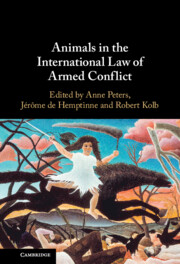Book contents
- Animals in the International Law of Armed Conflict
- Animals in the International Law of Armed Conflict
- Copyright page
- Contents
- Contributors
- Forewords
- Acknowledgements
- Abbreviations
- Part I The Need for Protecting Animals in Wartime
- Part II The Protection of Animals in International and Non-international Armed Conflicts
- Part III The Protection of Animals in Specific Situations
- Part IV Enforcement Regimes for the Protection of Animals in Wartime
- 18 Repression of International Crimes
- 19 Reparation and Rehabilitation
- 20 The Special Regime for Wildlife Trafficking
- 21 Enforcement Powers of the United Nations Security Council
- Part V Towards Better Protection of Animals in Wartime
- Index
- References
19 - Reparation and Rehabilitation
from Part IV - Enforcement Regimes for the Protection of Animals in Wartime
Published online by Cambridge University Press: 06 October 2022
- Animals in the International Law of Armed Conflict
- Animals in the International Law of Armed Conflict
- Copyright page
- Contents
- Contributors
- Forewords
- Acknowledgements
- Abbreviations
- Part I The Need for Protecting Animals in Wartime
- Part II The Protection of Animals in International and Non-international Armed Conflicts
- Part III The Protection of Animals in Specific Situations
- Part IV Enforcement Regimes for the Protection of Animals in Wartime
- 18 Repression of International Crimes
- 19 Reparation and Rehabilitation
- 20 The Special Regime for Wildlife Trafficking
- 21 Enforcement Powers of the United Nations Security Council
- Part V Towards Better Protection of Animals in Wartime
- Index
- References
Summary
The International Criminal Court’s regulatory framework is completely silent on the treatment of animals despite the fact that they have figured in every single one of its reparations proceedings. As a consequence, the International Criminal Court has been relegating animals to mere objects that can be used to repair the harm of human victims. Moreover, the court has been oblivious to the suffering of animals as a result of the commission of crimes within its jurisdiction. This chapter discusses the (improbable) scenarios where animals could indirectly benefit from reparations. It submits that the International Criminal Court should revisit the treatment of animals as mere objects.
Keywords
- Type
- Chapter
- Information
- Animals in the International Law of Armed Conflict , pp. 334 - 347Publisher: Cambridge University PressPrint publication year: 2022



